7 Best Shopify ERPs for your stores
In the long run, spreadsheets can’t keep up with fast-growing companies. Upgrading to Shopify Plus becomes an inevitably sound economical decision.
That’s where enterprise resource planning software or ERP comes in.
But, with so many Shopify ERP systems on the market, finding the right solution for your store can seem daunting.
In this article, we’ll go over what an ERP is, how it benefits ecommerce business owners and how to choose the right ERP for you.
Try MESA free for 7-days and enjoy support from automation experts!
Topics:
Most popular Shopify ERP integration solutions
What is an ERP system?
ERP is the acronym for Enterprise Resource Planning (ERP). Using this software, many enterprise systems are smoothly integrated into a single platform.
Above all, the main goal is to automate and simplify individual activities across a business or organization while providing transparency and cross-departmental alignment.
ERPs for ecommerce combine back-office operations such as inventory software, accounting software, warehouse management, HR functions, and Information Technology (IT) services to reduce the need for several separate systems.
This type of data is then used to produce insights and reports that help brands make meaningful, data-informed business decisions.
But before we get ahead of ourselves, let’s cover the basics of what a Shopify ERP solution might look like for your business.
What is an ERP in eCommerce?
A cloud-based ERP solution expands the breadth and depth of an organization. Additionally, this integration platform connects multiple sales channels, operations and procedures for a coherent, future-proofed business.
However, business processes are getting increasingly complex.
Any Shopify business needs a system that can turn an ecommerce integration of its customer data into powerful insights. As a result, with back-office operations being the backbone of every business choosing the best ERP systems are essential for storing sensitive client data and long-term success.
Shopify ERPs by the numbers
The past few years have been huge for ERP solutions. According to Market Research Engine, the Enterprise Resource Planning Market is expected to exceed more than US$ 49.50 billion by 2025.
But the question is, what is the real value in having an ERP system?
When asked to select areas where ERP produced ROI, the top three answers were reduced IT costs (40%), reduced inventory management levels (38%), and reduced cycle time (35%).
The same research shows that ERP integration led to business process improvement for 95% of businesses.
And according to Trust Radius, the top 3 industries using ERP software include Manufacturing (34%), IT (15%), and Financial Services (14%).
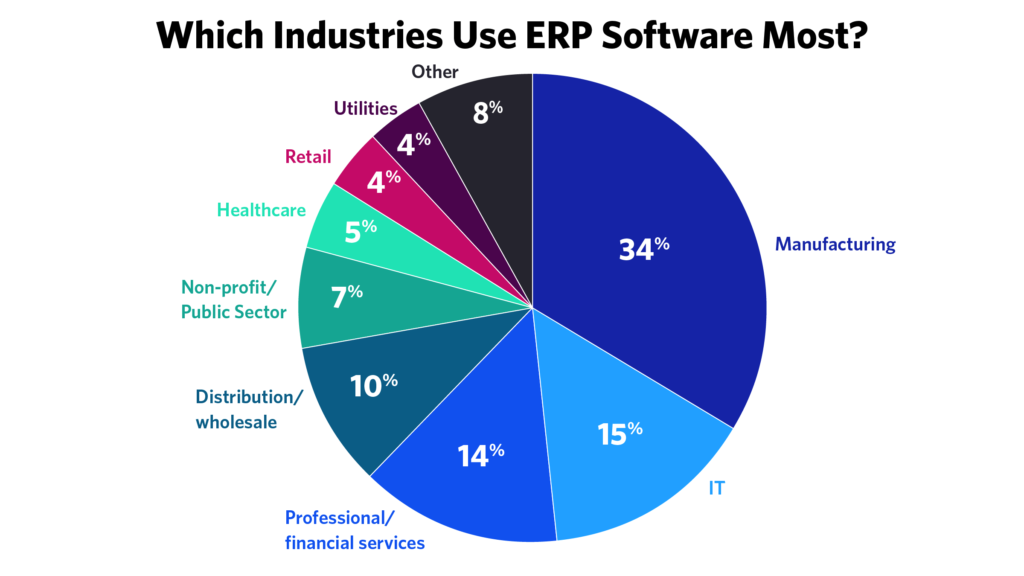
What started more than 50 years ago as Materials Requirements Planning (MRP) software has evolved into ERP implementations that fully integrates every department.
Gartner originally coined the term “enterprise resource planning” back in 1990. Since then, ERP systems have moved towards the Software as a Service model (SaaS). This eliminated the roadblocks for adopting this software instead of needing expensive infrastructure and IT staff.
Since then, there have been advancements by incorporating artificial intelligence (AI) and the Internet of Things (IoT) into ERP systems. Gartner predicts that AI will be integrated into ERP systems by 65% of CIOs by 2022.
Why use an ERP with Shopify?
What was once simple (when you only received a few dozen orders a day) might quickly become unbearable.
Manually dealing with orders that number in the hundreds or thousands each day isn’t scalable. Information becomes challenging to keep track of—especially if your organization operates in numerous locations or multiple platforms.
For a while, you can get away with piecing things together in spreadsheets or even one-off integrations. But at some point, this heavy-lift means there’s simply too much manual labor, as well as inaccurate reporting and missed opportunities.
Ecommerce business owners spend more time handling paperwork tasks instead of concentrating on what matters: growing their company.
Key benefits of Shopify ERP integrations
Here are the main advantages of a Shopify ERP integration:
Productivity
Your most important data can be accessed in one place with an ERP for ecommerce, allowing you to streamline your many platforms.
By automating many daily tasks with integrated ERP systems, ecommerce brands can reduce the number of employees involved in the sales process by streamlining and automating web orders and shipments.
For example, your back-office ERP user can immediately track and begin processing the new order without the need for manual data entry. This reduces data redundancy and human error.
Better decision making due to centralized business insights
Data from ERP modules helps management and key stakeholders make better decisions, optimize their processes, and spot potential dangers and problems in its operations.
Thanks to an ERP’s real-time data, customers can also see their orders, follow shipments, and continue shopping with precise inventory counts. Inventory errors and back-ordered products are decreased due to this information, which also lowers overall operating costs.
ERPs provide a unified perspective of the business across the distributed organizations, allowing for continual improvement as it streamlines processes between departments and functions.
Finally, businesses can eliminate the need to re-enter data by linking their ecommerce storefronts with payment systems and delivery information so they know which marketing workflows are performing best. Human intervention is eliminated as much as possible, again lowering the risk of human error.
Provides better customer experiences
It’s essential to place a high value on customers’ happiness, which includes providing them with an excellent online shopping experience and promptly and accurately shipping their purchases. Improved customer satisfaction results from ERP systems providing your customers with all of the information they need to make informed decisions.
When you integrate an ERP with your Shopify store, your customers will have more confidence in your products and services since they will access up-to-date information about the entire purchasing process.
Your customers can select their preferred shipping options, including delivery schedules and handling prices. Complex split shipping can be made considerably simpler, allowing shipments to many global addresses to be sent using various modes of transportation.
It’s easier for customers to spread the word about your business if they have faith in you and are happy with the overall customer experience.
What to look for in a Shopify ERP
If you’re on the hunt for an ERP system for your Shopify Store, you’re probably overwhelmed by the number of choices. Be smart—avoid the analysis-paralysis by understanding what you need for your business, and go from there.
Here are some pointers to help you focus on things that matter:
Shopify compatibility
One of the most important factors you should have in mind when choosing an ERP system is whether it can be easily integrated with Shopify. No matter how good a solution is, if it’s not compatible with Shopify, it will only be a burden instead of an efficiency booster.
Seamless integration
Obviously, understanding how a system integrates with the overall tech stack is essential. Think of the ERP system as a gear in the mechanism. If it fits, it will accelerate the mechanism; if not, it will break it completely. This will help you be more efficient and share data between your ERP and other business platforms.
Scalability
Undeniably, the ERP you choose can have a significant impact on your business. It can either future-proof your business or make it vulnerable. It’s important to understand how the software grows with your company and if it’s scalable and easily upgradable.
Ease of use
The complexity of an ERP can be a stumbling block for users. Not only will it increase the cost and time of training, but it will also negatively influence the adoption process. Look for a vendor with a straightforward user interface, role-based functionalities, and customization.
Mobile-friendly
Unquestionably, we’re living in a mobile-first world. Most of the solutions are already in our pockets. With the rise of mobility and BYOD (bring your own device), choosing a mobile-friendly ERP system will increase your productivity.
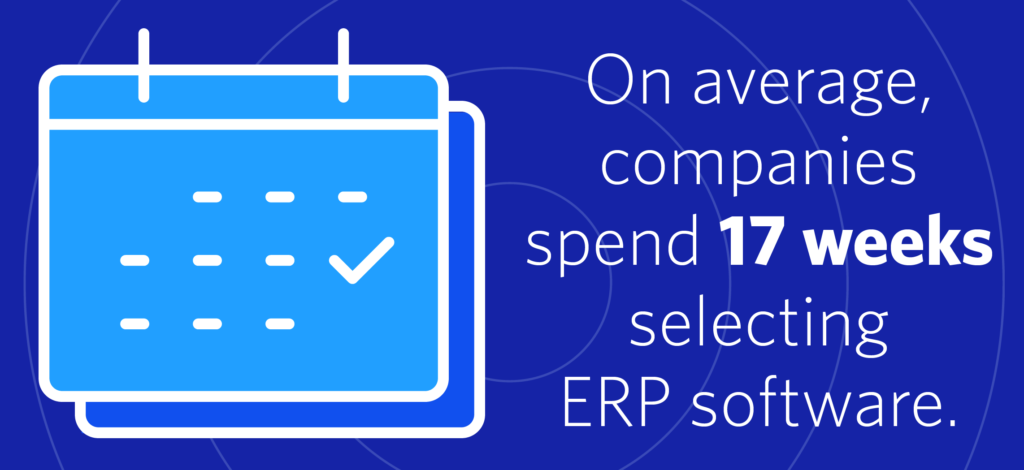
7 best Shopify ERPs in 2022
The hefty initial investment in technology solutions makes it a difficult option to make. However, in the long run, these investments pay off. Here are a few ERPs that can make your ecommerce business run smoothly.
Odoo
Odoo is an open-source ERP software, leveraging thousands of developers and business experts to build an ecosystem of fully integrated business apps. The system includes customer relationship management (CRM), e-commerce, accounting, billing, inventory management, project management, warehouse management, financial management, manufacturing, and purchasing.
It is a suitable ERP solution for small and medium-sized organizations, and you should consider it while evaluating software. Odoo and third-party apps may easily be integrated to streamline your business operations, business management, and finance management.
The Community edition is free to use on the desktop for experienced IT engineers familiar with Python and other computer coding languages. Still, it lacks many of the capabilities found in the Enterprise edition.
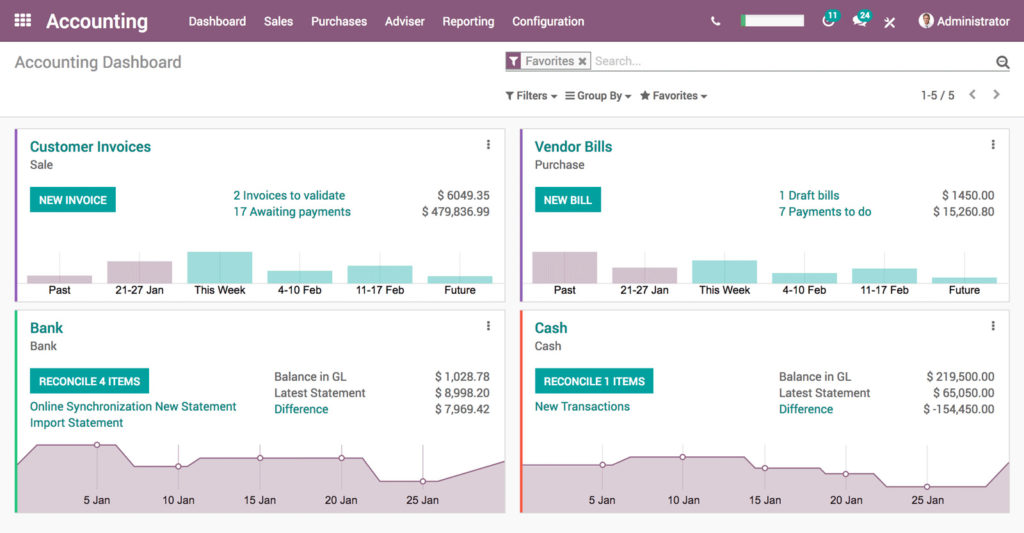
What makes Odoo unique is the framework that allows the community of developers to release regular updates. Odoo comprises over 30 main modules, and more than 27,000 third-party apps available in its app store. Because it’s a modular system, customers can customize it to their preferences and add modules as needed.
MESA Template ID
manage-odoo-products-from-shopify-updates
Netsuite
Oracle NetSuite is one of the most well-known options when it comes to cloud-based business management.
Many businesses rely on NetSuite for enterprise resource planning (ERP), inventory management, financial tracking, ecommerce platform, and customer relationship management (CRM). There are a variety of commercial applications that can benefit from this platform’s adaptability.
NetSuite is available for as little as $99 per month per user, with a platform charge of $999 per month. The cost of a solution will vary based on the specifics of your requirements.
Licensing expenses might add up quickly depending on how many users you need to use the ERP system.
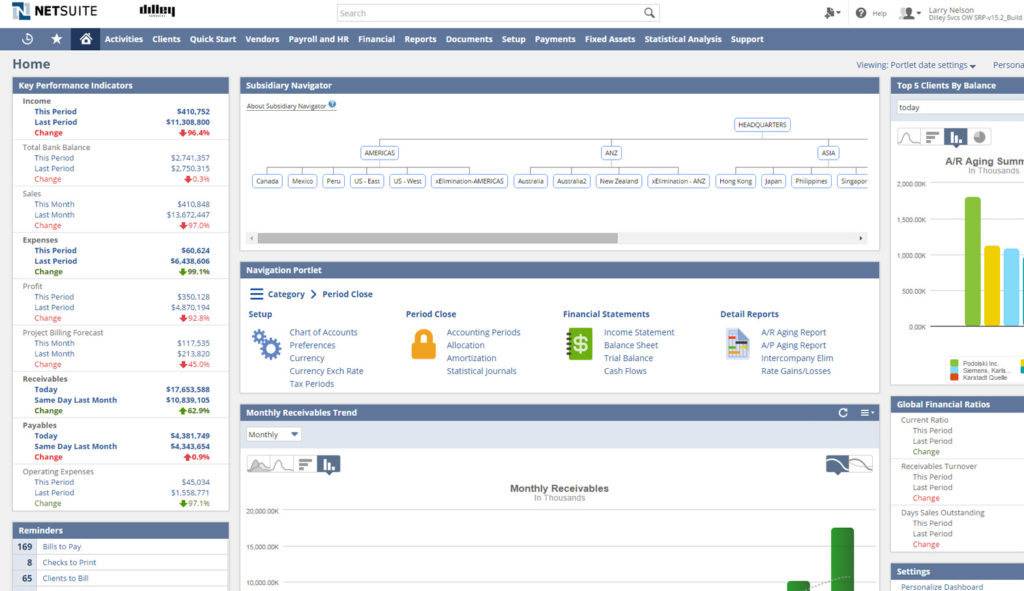
Suitable for companies of all sizes, NetSuite ERP gives companies clear visibility and control of their business. It automates front- and back-office processes while combining data with visual analytics to generate meaningful and actionable business insights.
NetSuite is the world’s most deployed cloud ERP solution, used by more than 28,000 customers across more than 200 countries.
With built-in business intelligence and real-time reporting, it equips organizations to make better decisions. This system is highly-scalable, so users can easily add functionalities as their business grows.
Integrating Netsuite with your Shopify store will help you drive better results and unlock the power of this comprehensive Shopify ERP solution.
SAP
With over 45 years of experience and 200 million cloud users in 180 countries, SAP is one of the world’s largest enterprise software companies.
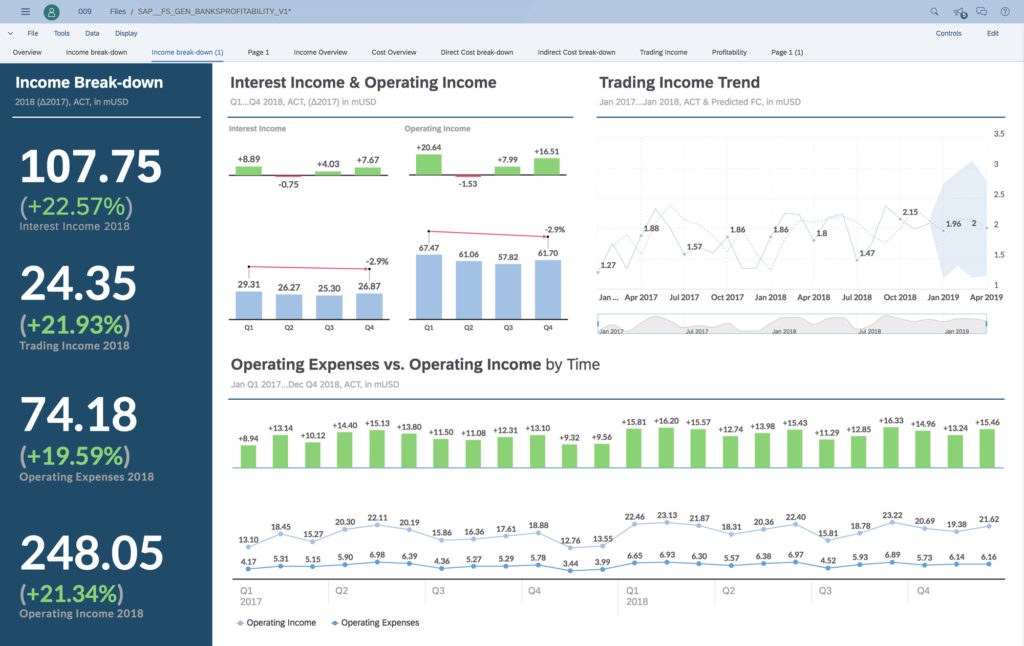
SAP ERP helps clients effectively manage their organizations. It’s highly scalable, and it can be deployed as a SaaS service, on-premise, or as a hybrid model.
This ERP platform has all the capabilities of supply chain management, product lifecycle management, human capital management, financial management, and CRM solutions. Despite the common misbelief that SAP is only for large enterprises, 80% of its customers are small and mid-size businesses.
SAP has proven expertise in 25 industries, including retail, manufacturing, wholesale distribution, and professional services.
The most effective way to link Shopify Plus to SAP ERP is to use a third-party solution that automatically synchronizes data, removing the possibility for human input error.
Microsoft Dynamics
Dynamics 365 is a modular, cloud-based enterprise resource planning system that offers tools for sales, marketing, CRM, project management, marketing automation, project service automation, sales forecasting, financial tracking, and more.
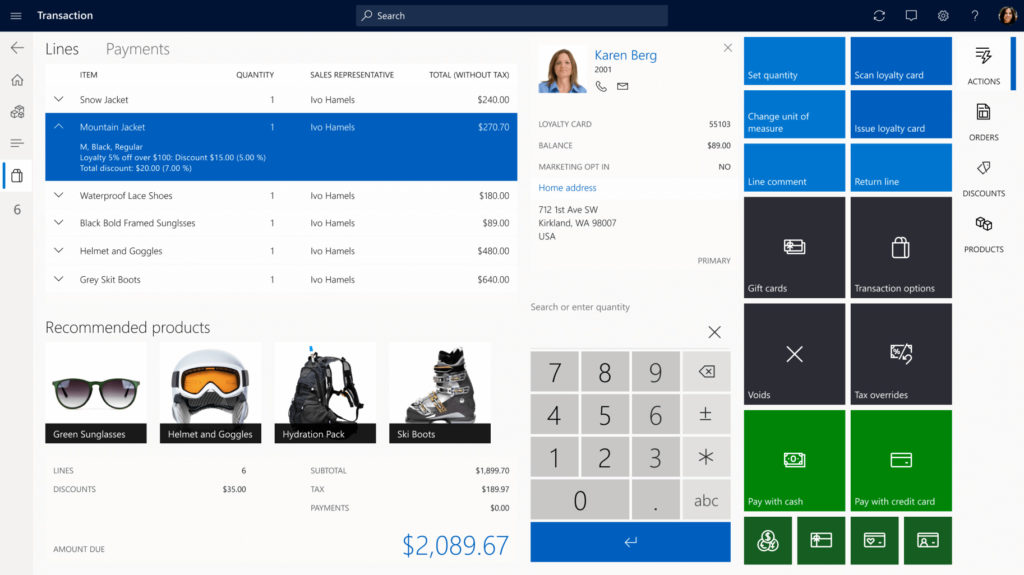
What makes this ERP special are the advanced customer relationship management (CRM) capabilities and integration with Microsoft products and LinkedIn Sales Navigator.
Dynamics 365 helps companies make data-driven decisions, increase efficiency, and get predictive insights. This is one of the most adopted ERP systems that serve businesses, nonprofits, and governments worldwide.
The solution goes a step further by incorporating artificial intelligence (AI), machine learning, and mixed-reality tools for businesses.
Microsoft Dynamics 365 is available on iOS, Android, and Windows phones. Users can use the apps offline, and data will sync automatically once a connection is reestablished.
Integrating Microsoft Dynamics 365 with Shopify Plus will improve sales forecasting, customer communication, and reporting.
Sage ERP
This enterprise resource planning software integrates day-to-day business processes and helps companies streamline activities by leveraging accurate business insights.
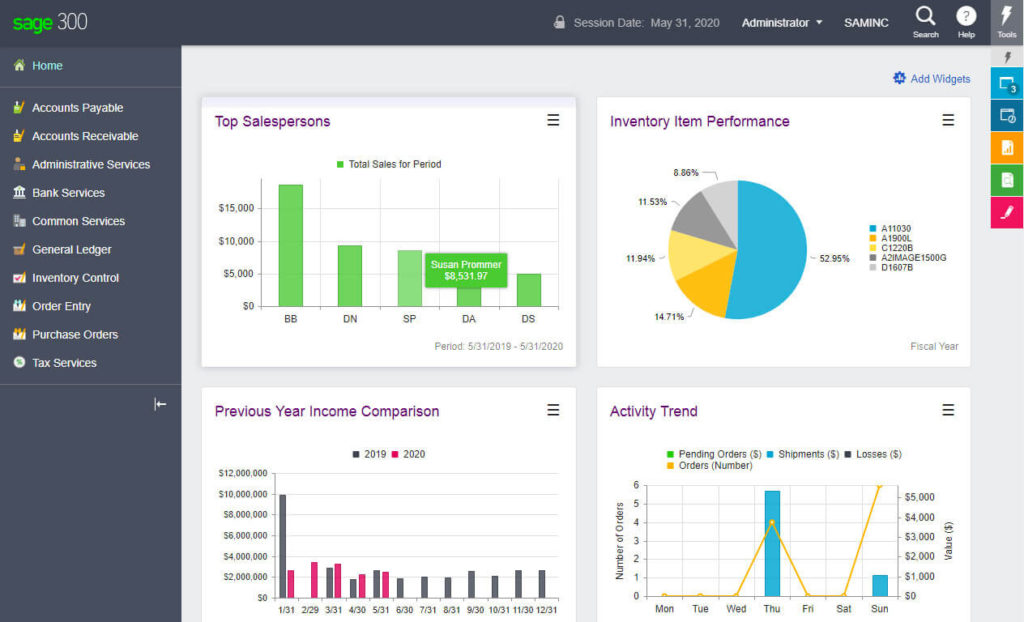
Users can connect the dots and share information across different departments, including HR, accounting, inventory management, and customer relationship management.
Their traditional ERP solution is offered through Sage Business Cloud. For more complex business needs, there is the Sage Business Cloud X3 for established businesses looking for greater efficiency, flexibility, and insight.
Using these tools, users can streamline key processes, increase productivity, identify areas for improvement, and plan business growth.
Sage is another ERP system that can integrate with Shopify Plus to empower seamless order fulfillment, sales transactions, and real-time updates on stock levels.
Epicor
Available in both on-premise and cloud-based solutions. Epicor takes aim at small and mid-sized businesses (SMBs), with a special focus on companies specializing in manufacturing and distribution.
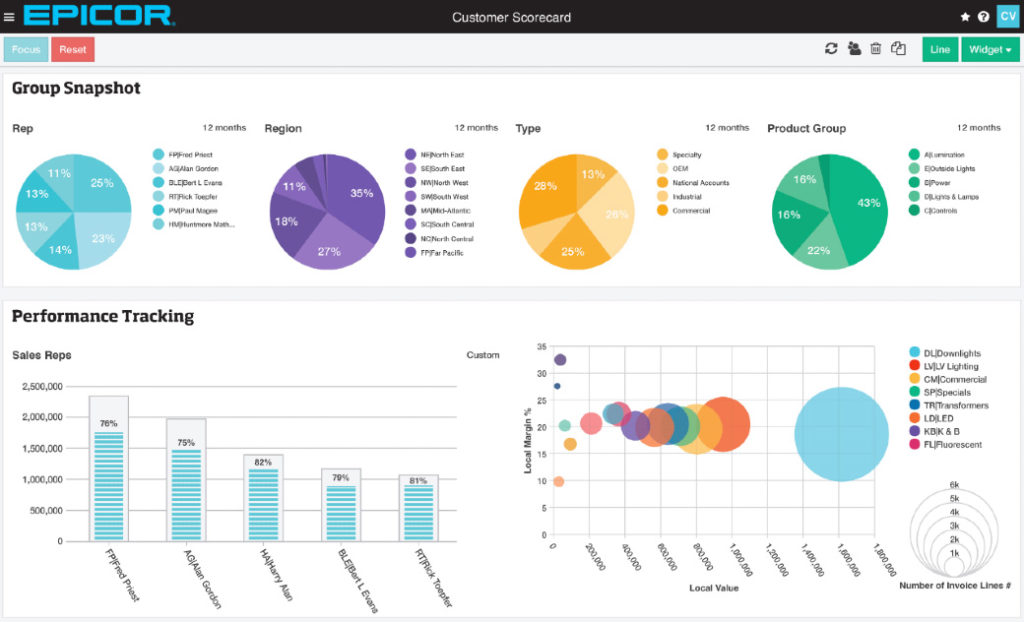
Using dashboards, companies can display key performance indicators (KPIs). However, setting up the dashboards can be challenging without the help of an IT department.
Epicor’s mobile solutions allow users to assign work orders, manage inventory, review service history, complete billing processes, and more from any remote location.
Thanks to the Epicor Integration Cloud, powered by Jitterbit, companies can seamlessly connect this ERP to any in-house, on-premises, or cloud-based system.
With the right Shopify to Epicor integration, businesses can automatically synchronize sales orders, products, and pricing but also reduce order processing times and costs.
Blue Cherry
BlueCherry is an ERP solution by CGS suitable for large and midsize apparel manufacturers.
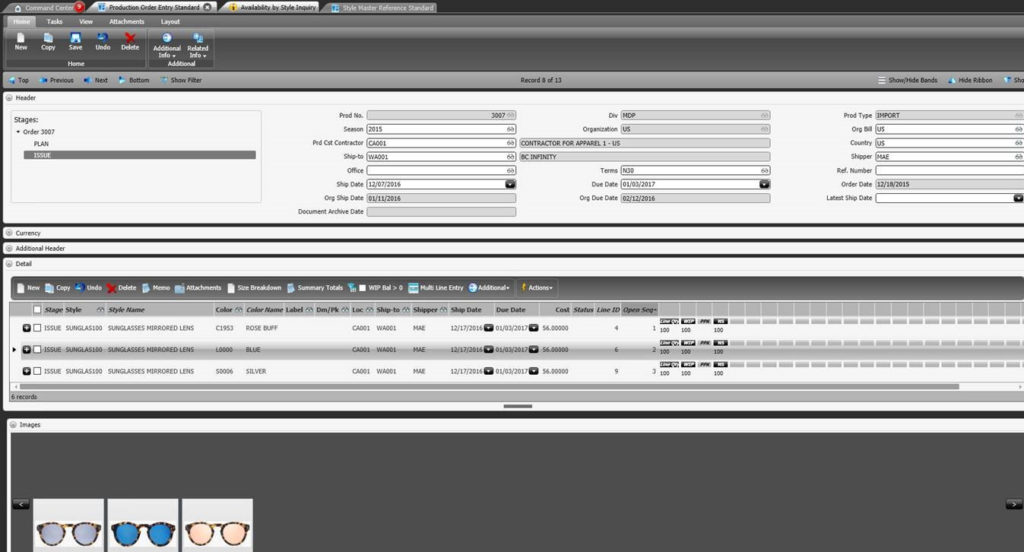
This omnichannel ERP software empowers companies to streamline processes, gain greater visibility, increase productivity and operational efficiency, reduce costs, and enhance competitiveness.
As an end-to-end fashion, footwear, and apparel ERP software, BlueCherry has business intelligence solutions that help users understand the most important issues, trends, and opportunities.
Fashion and apparel companies are faced with increasing supply chain complexities. BlueCherry is designed to help them overcome challenges and gain greater control of their supply chain.
BlueCherry integrates with the most popular ecommerce platforms such as Shopify, Magento, BigCommerce, and others. By connecting their ERP system to Shopify, users can automate several functions such as retrieving online orders, updating products and inventory, and immediately providing shipping information to their customers.
Is an ERP for Shopify right for my ecommerce business?
The short answer: Maybe
Coordinating an array of business activities daily can be a real hurdle. Most people are just after collecting all pieces from your various apps and online systems. ERPs are typically large middleware systems that will require serious investment in both money and time to implement.
Ultimately, it’s the driven, overwhelmed staff that identify a few key motivators for thinking they need an ERP:
A better way to work
- Balance smarter hacks that allow some daily peace of mind.
- Make automated processes and tame the everyday chaos.
- Build a cohesive Shopify Plus business with clever solutions to lighten workloads.
All your apps working together
- Integrate other systems into a single view for accurate data and better decision-making.
- Expand the reach of business data into any app connected to the internet.
- Support a native integration solution to simplify the reliance on custom code.
Shopify Expansion Pack
- Create unique experiences for teams and customers.
- Take Shopify Plus to new heights, faster than competitors.
- Do more with the data and apps already in use.
Business leaders must take advantage of the fact that this Shopify ERP integration is now more accessible than ever before. An ERP is now necessary for any company that wants to compete and win in today’s global marketplace.
The Best Shopify ERP integration solution
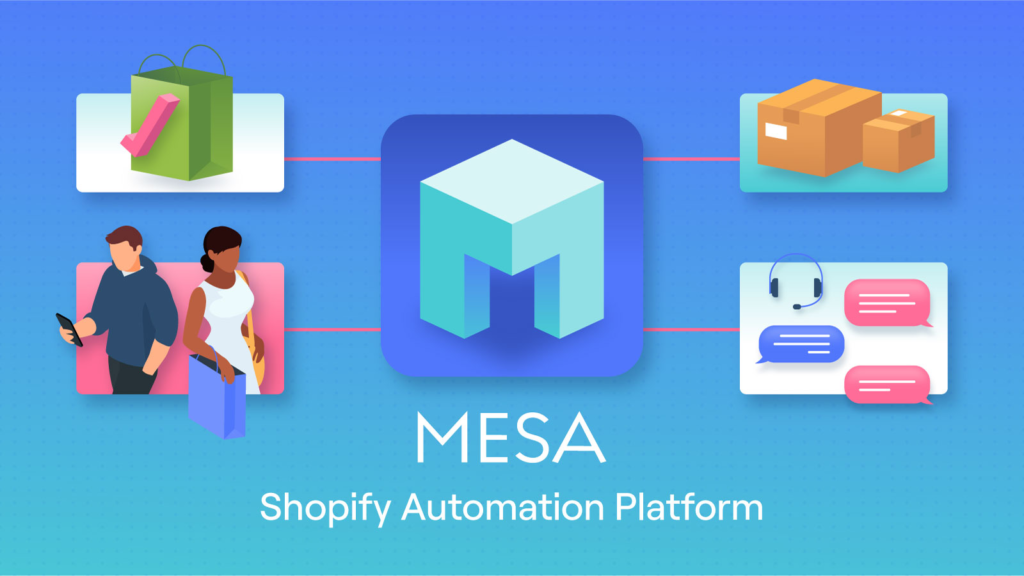
MESA lets you create action and trigger-based workflows, taking the complexity of code out of the equation. Create the perfect automation workflow for customers’ complex problems.
Also, you get 24×7 access to our team of experts. We’ll help you find automation templates or build any integration to ensure you deliver the best experience.
Lastly, if you’re looking for expert workflow setup? You can count on us for that too. We’ll take care of large integration projects for your agency and handle the complete setup for each integration.
If that sounds interesting, why not give MESA a try?


